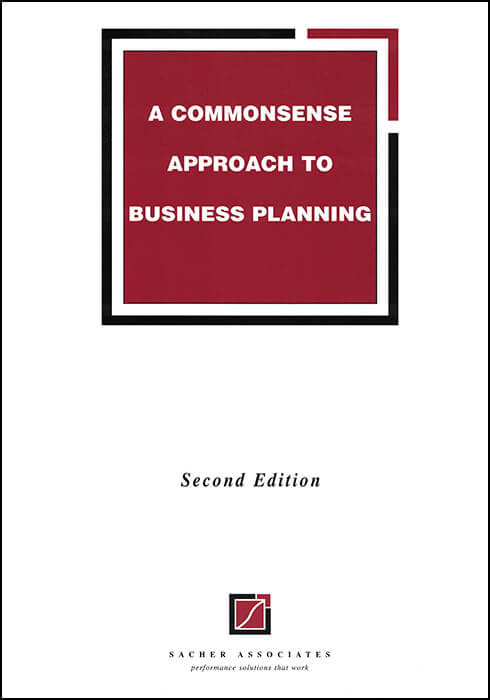
A commonsense approach to business planning EBook
Publisher: Independent Pubs
Author: Harold Monty Sacher and Merryl Sacher
Format: EBook
Pages: 292
Released: Second edition 1996
This EBook provides a step-by-step guide to planning and implementing a strategic plan for your organisation, department or team. It leads you through exercises and activities to provide you with a developed business plan and comes with a workbook.
Commonsense Approach to Business Planning is a practical guide to effective organisational planning. This is a comprehensive strategic business planning system, which includes a user-friendly workbook. Now you can create a unique business plan for your organisation. It will be one that is jargon-free, that you and your people own and understand. Month by month it will become a working document for each part of the business - a growth tool for all.
This EBook and its workbook will lead you through a series of exercises and activities, the outcome of which will be a developed business plan which will enable you to communicate your goals to staff, customers, suppliers and other organisations so that you may gain their support.This provides a straight-forward, simple, yet comprehensive approach to business planning.
Follow the instructions, and you will benefit from an improved understanding of the planning process and through greater commitment from staff to the business objectives to which they have contributed.
Book content
The Business Planning Manual is divided into two parts, Part One being the introduction and how the planning system works, and Part Two, the seven modules of the plan itself, concluding with an actual example to aid implementation. Examples, summaries, checklists, glossaries and quality standards are included throughout the manual.
The business planning workbook is threaded through the manual which on completion becomes a working business plan. Below is a sample of some major content headings.
PART 1: INTRODUCTION
Introduction
- How A Commonsense Approach to Business Planning was developed
- About the authors
- How to use A Commonsense Approach to Business Planning
The Big Picture
- The Basic Components of Team Performance
- A Unified Sense of Direction
- Strategy, or Long-term Goals
- Outputs and Performance Measures
- Feedback
- Reward Systems
- Targets
- Training
- Structure and Job Design
- Systems & Processes
- Communication
The Planning System
- The planning system
- Why business planning is important
- Let's look at some of the reasons why businesses do not plan
- What do business plans achieve?
- A systems approach to planning
- Understanding the terminology
- Time frame
- The planning system - the big picture
- Business planning model
PART II: THE PLAN
Section One: A Unified Sense of Direction
- Values, vision and mission: What are they, and what's the difference
- The importance of focus and balance
- Implementation of a unified sense of direction: Guidelines and pitfalls
- Workbook exercises to develop values, vision and mission
Section Two: Environmental Analysis
- Environmental analysis
- Example
- Workbook exercises to complete a S.W.O.T. analysis
Section Three: Strategy Formulation
- Why formulate a strategy for your organisation?
- How to formulate strategy or strategic goals
- Competitive advantage
- Developing your business strategy
- Workbook exercises to develop strategic goals
Section Four: Target Setting
- Why set targets
- Quality standards for effective targets
- Common pitfalls when target setting
- Workbook exercises to develop targets for strategic goals
Section Five: Financial Plans
- When do we prepare financial plans?
- Proposed financials
- Why financials are important
- Financial plans
- Using your financial data to improve your business
- Workbook exercises to develop financial plans
Section Six: Resource Requirements and Action Planning
- Identifying resource requirements
- Action planning
- How action plans help achieve targets
- Guidelines for preparing action plans
- Pitfalls when developing action plans
- Action planning - the logistics
- Progress review meetings
- Workbook exercises to develop action plans for selected targets
Section Seven: Evaluation
- Steps in the evaluation process
- Workbook exercises to evaluate the business plan
- A complete example of a business plan (Example of business plan is provided)
What readers say about our books
Fundamental to the future development of my business. It is just what is needed to help get small business on track and to assist with growth and development. Mandy Forward, Leber Storage Systems
I looked at it and thought, hell, this is it. It was so elementary and straightforward, and it helped me sort out my thinking process. Danny Doubell Kempe International
I thought to myself, 'this all fits together so well'. I found your manual very easy to read, and whipped through it. It was presented in a clear and logical manner, and will certainly help me in my work. Angie Roger New Zealand Fire Service
The manual is so well written and the jargon is very similar to what is used in this company. Errol Jaeger Superintendent Strategic Planning, Worsley Alumina
It is very impressive yet simple in concept and terminology. Of course, it is all 'common sense' - why is it that common sense is not common? Graeme Atwell, Station Manager Torrens Island Power Station

